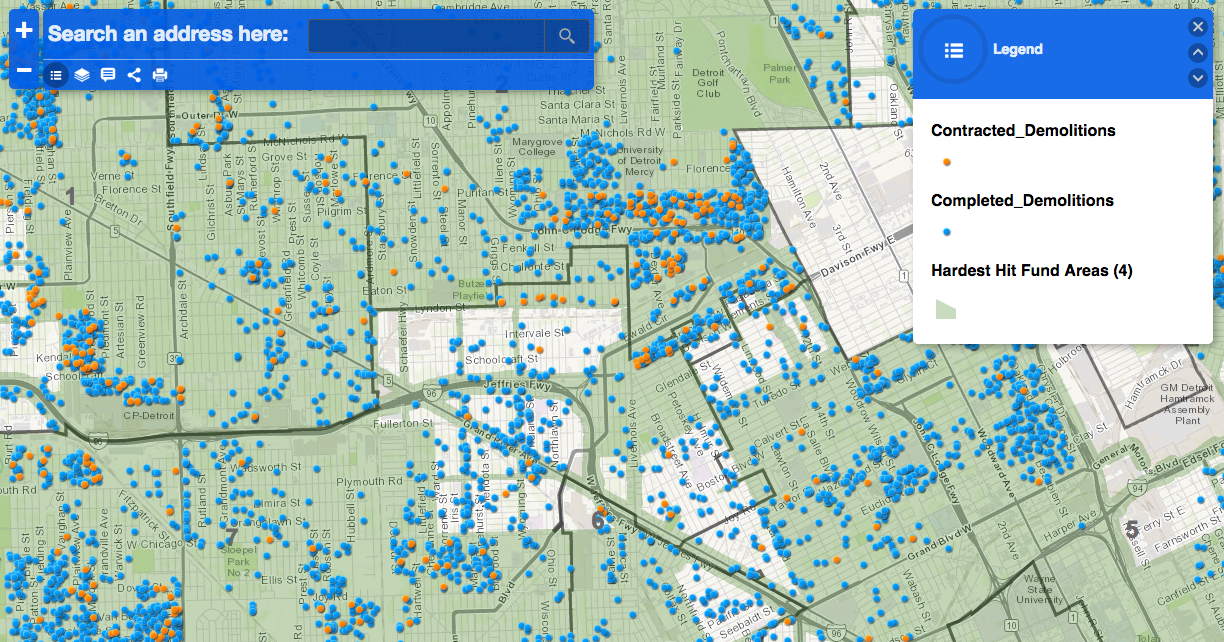Tracking Detroit’s Blighted Property Demolitions Like Packages or Pizzas
Vacant homes in Detroit Shutterstock

Connecting state and local government leaders
A newly released online tool has an interactive map that includes information about contracts to take down individual structures.
Data about the demolition of thousands of vacant and abandoned buildings in Detroit became available Thursday through a new online tracking tool developed by the city.
The Detroit Demolition Tracker allows users to view information about upcoming and completed demolition projects using an interactive map that they can click around on, or search by punching in an address. Clicking dots on the map that represent demolition sites reveals the date a building was demolished, or when it is scheduled to be razed.
Other information is displayed as well, including the name of the contractor completing the work at each site and how much they’ll be paid.
Mayor Mike Duggan’s office describes the city’s blighted property demolition program as the largest of its sort in the nation.
At least 9,528 vacant and abandoned buildings have been torn down since 2014, according to the Demolition Tracker website. And, as of early May, the city had been allocated $170 million in federal blight removal funds.
Overseeing the city’s demolition activities are the Detroit Building Authority and the Detroit Land Bank Authority.

‘Why Not Make It Public?’
“We've increased the pace of demo from about 25-a-week to 150-a-week,” said Brian Farkas, director of special projects for the Building Authority. “When you do that, it really involves just a massive amount of data."
People are interested in what that data shows. Some, for instance, are keen to know when a blighted property in their neighborhood is scheduled for demolition. "We're seeing a lot of resident engagement around what the upcoming demos are," Farkas said.
But it has taken the city time, he explained, to get data about demolitions cleaned up and organized well enough so that it could be published online. With that work completed, Farkas said, “why not make it public? People should have a right to know what's going on in their neighborhood in the easiest way possible.”
Farkas expects the city will also see benefits from the new tool, because it stands to cut down on the time staff spend fielding inquiries from residents and others about demolitions. “There's hundreds of calls the city gets a day asking: ‘when is this house getting demolished,’” he said.
Demolition Program Has Faced Scrutiny
Federal funds for blight removal in Detroit, and in other cities, have flowed to states in recent years from a U.S. Department of Treasury program known as the Hardest Hit Fund.
The fund was formed in 2010 as part of the Troubled Asset Relief Program, which was established in the wake of the Great Recession and included a number of initiatives meant to stabilize the U.S. financial system, help the economy, and prevent foreclosures.
Housing finance agencies in 18 states and the District of Columbia have received money from the fund. It was mid-2013 when the Treasury Department began allowing seven of those agencies to direct the money toward blight elimination activities.
On Thursday, the Office of the Special Inspector General for the Troubled Asset Relief Program issued a report saying the Hardest Hit Fund blight elimination program is significantly vulnerable to risks of unfair practices and overcharging that could lead to waste, fraud and abuse.
And Detroit’s demolition program has specifically come under fire. Earlier this year, the inspector general’s office behind Thursday’s report subpoenaed the city’s Auditor General’s office seeking records related to the program. The Auditor General’s office itself began looking into the program last year, amid concerns over rising costs and questions about contracting practices.
Tracking Demolition Like Pizzas or Packages
Duggan, according to Farkas, has strongly supported publishing data about the demolition program online. After Farkas described his plans to the mayor for the data he wanted to see released, like contractor names and project prices, Duggan’s response, he said, was: "do it."
“The mayor [has a] commitment to open data. He’s 100 percent behind it,” Farkas added. “We as the demolition team really wanted to embrace it.”
Updates to the information displayed in the Tracker occur automatically each day at 5 a.m.
In addition to the map, the data, which dates back to 2014, is also available in an interactive and downloadable online spreadsheet. Data fed into the Demolition Tracker originates in the city’s Salesforce system, a platform used to manage contract information for each project. The Tracker incorporates an open data interface from Socrata and mapping technology from Esri.
The tool was developed by the city internally, without an outside vendor, according to Farkas. Along with the Building Authority, the city’s department of information technology and the land bank played key parts in that effort.
As the Tracker was developed, Farkas said the city gathered feedback from civic technology groups and residents. This spurred some changes to the initial design, he said, intended to help users reach the map tool with fewer clicks and less searching on the city’s website.
Farkas said he’d been looking recently at online tracking interfaces companies like Domino’s Pizza and FedEx use and would like to see the Demolition Tracker evolve along similar lines.
"If you can track a package on FedEx.com,” he said, “why not do the same thing for demolitions in Detroit?”
Bill Lucia is a Reporter for Government Executive’s Route Fifty.

NEXT STORY: Record-Breaking Heat Bakes Arizona; Trump Prompts Mayor to Leave GOP



